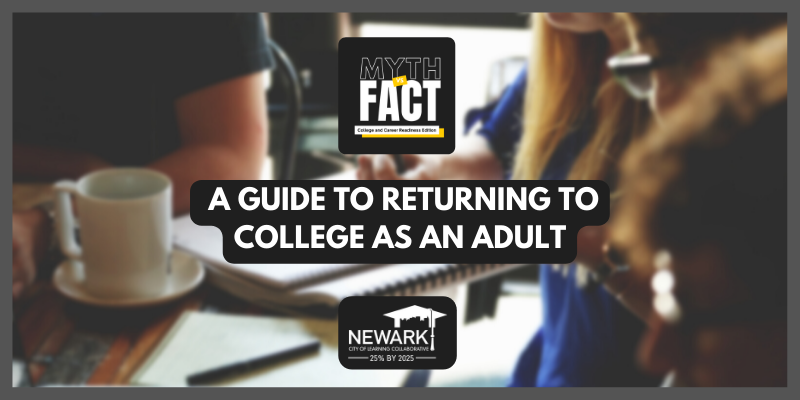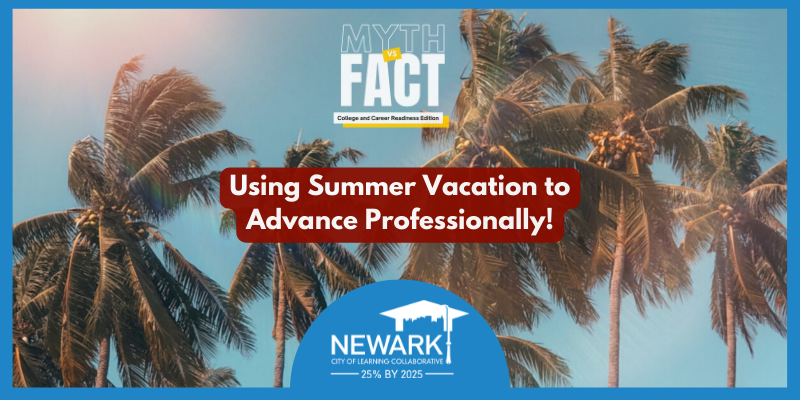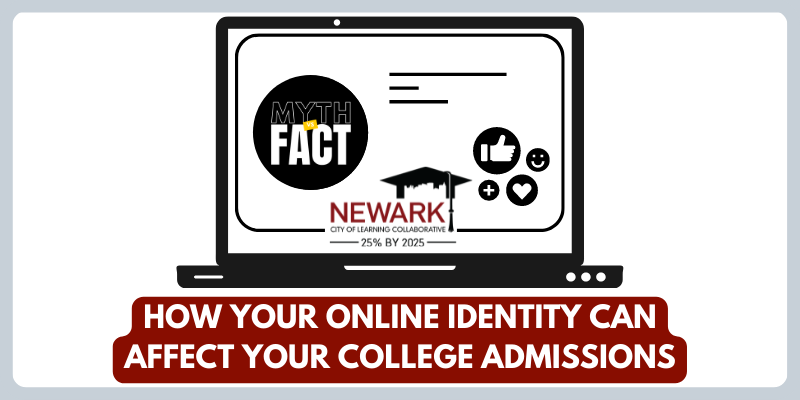
by Nasir Ismail | Mar 21, 2022 | Blog, Myth vs. Fact, Resources
For anyone who is uninterested in a four-year degree, but wants to enhance their skillset, trade school may be the perfect option for you.
Some common reasons trade school is a better fit for you:
- Bachelor’s Degree programs seem to offer unessential knowledge
- You want to learn practical skills to earn more money
- Bachelor’s Degree programs take too much time to complete and you have a busy schedule
- You are only able to spend only up to two years in school because of other responsibilities
- Bachelor’s Degree programs lead to jobs you can’t imagine yourself pursuing
- You want to pursue a career in the skilled trades
Trade schools offer vocational training that can lead to a successful career in less than half the time it takes to complete a bachelor’s degree. At one of these institutions, you can learn a new skill or craft and get hired for it all within a few months to two years.
New Jersey has some of the best trade schools with all kinds of programs to choose from. Whether you are interested in carpentry or healthcare, or anything that may fall in between, there is a New Jersey school that’s right for you.
1. Lincoln Tech College
- Lincoln Tech has six different campuses spread across New Jersey. The college offers courses for the industries in the highest demand like IT or Healthcare.
- Career paths (and their NJ campuses) include:
- Computer & Network Support Technician – Iselin, Moorestown and Paramus
- Medical Assistant – Iselin, Moorestown and Paramus
- Medical Coding and Billing – Paramus
- Patient Care Technician – Moorestown, Paramus
- Practical Nursing – Iselin, Moorestown, Paramus
- Automotive Technology – Union, Mahwah
- Electrical and Electronic Systems Technology – Union, Mahwah
- Automotive Mechanics – Union
- Air Conditioning, Refrigeration & Heating Technology – Union, Mahwah
- Computer Numerical Control (CNC) Machining and Manufacturing Technology – Mahwah
- Diesel and Truck Technology – South Plainfield
- Heavy Equipment and Truck Technology – South Plainfield
- Welding and Metal Fabrication Technology – South Plainfield
- Costs
- Depend on which program you choose.
- Varies from $13,800 to $39,232
- Website
2. Eastwick College
- Eastwick College works in conjunction with the HoHoKus School of Trade and Technical Sciences. They have campuses in Nutley, Hackensack, Ramsey, and Paterson and offer a wide range of career training programs.
- Career paths include:
- Bilingual Licensed Practical Nursing
- Business Operations and Accounting
- Electrician Apprenticeship
- Electronics and Computer Technology
- Facilities Management
- HVACR
- Licensed Practical Nursing
- Manufacturing Technology
- Medical Assisting
- Medical Billing and Coding
- Plumber Apprenticeship
- Welding
- Costs
- Depends on which program you choose and how long it takes you to complete.
- Varies from $12,165 to $39,231
- Website
3. American Institute
- American Institute began by offering career training programs in business, but now also offers several programs in legal, allied health, diagnostic medical sonography, and IT. There are campuses in Clifton, Somerset, and Toms River, NJ.
- Career paths include:
- Administrative Office Professional
- Dental Assisting
- Diagnostic Medical Sonography
- ESL – English as a Second Language
- Massage Therapy
- Medical Assisting
- Medical Coding and Billing
- Nurse’s Aide – FastTrack
- Costs
- Tuition fees are comparable to the other NJ Trade schools. They vary from $12,995 and $32,995.
4. New Educare Institute of Healthcare
- New Educare is a healthcare centered institution offering courses mainly in various different healthcare programs. The programs are designed to help students earn careers in allied health professions. The campus is located in Newark.
- Career paths include:
- Patient Care Technician
- Clinical Medical Assistant
- Phlebotomy Technician
- EKG Technician
- EKG and Phlebotomy Technician
- Pharmacy Technician
- Surgical Technician
- Surgical Instrument Technician
- Dental Assistant
- Administrative Medical Assistant
- Medical Billing and Coding
- Restorative Care or Aide
- Rehabilitation Therapy Technician
- Costs
- Varies depending entirely on program of choice.
- Website
- For more information, visit: https://www.neweducare.com
5. Jolie Health and Beauty Academy
- Jolie Health and Beauty Academy is designed for students interested in cosmetology and other related professions. They offer hands on training programs for students aspiring to make it in the beauty industry. Campuses are located in Cherry Hill, Northfield, and Turnersville, NJ.
- Career paths include:
- Barbering
- Cosmetology
- Esthetics/Aesthetics
- Skin Care Esthetics
- Costs
- Tuition for these programs varies between $7,861 and $18,455.
- Website
- For more information, visit: https://www.jolieacademy.com
Paying for Trade School
There are a few ways that you can pay for trade school. You can either pay in cash by saving up and charging the amount due for your tuition every semester. This is the most straightforward, but also the most immediately expensive.
You can enroll in a payment plan that splits up your tuition costs throughout the months of each semester you enroll in. This makes sense if you are working and are earning a steady income, but would rather not pay in full.
Other options include filing for financial aid. Contrary to popular belief, trade school students are eligible for financial aid through FAFSA! It is not limited to Bachelor’s degree or post-graduate degree programs. The Free Application for Federal Student Aid (FAFSA) will show you if you are qualified for financial aid or not. If not, you can see which student loans you may qualify for to cover the costs of your term bills.
You can also apply for scholarships, grants, and other financial awards to help fund your technical education.
Time to Apply!
Hopefully, this list helped you create an idea of where you want to take your career with trade school. These are the best five trade schools in New Jersey, and programs that they offer, so that you can understand your options when it comes to trade school. Depending on what you like and the career you want, these schools and programs can help bring your dreams to reality!

by Nasir Ismail | Mar 21, 2022 | Blog, Myth vs. Fact, Resources
Returning to College as an Adult:
Whether you are looking to get started on your education, finish it, or switch careers, it’s never too late to go to college. The Lumina Foundation reports that 38 percent of undergraduate students are older than 25, 58 percent work while enrolled in college, and 26 percent are raising children. College is a great place for working professionals, and enrolling might help you advance professionally.
This guide will help you assess the benefits and the potential drawbacks of going to college. Hopefully, this will help you make an informed decision about whether college, at the moment, is right for you!
Balancing School With Your Personal Life.
This is one of the hardest obstacles for most adults returning to school.
Everyone has a personal life filled with details, people, and problems unique to themselves. It is important to recognize that college is a multi-year commitment, and should be treated like a full-time job, since that is exactly what it aims to prepare you for.
Be sure to find flexibility in your schedule, find proper child care, identify means of transportation, and make the necessary life adjustments to be fully ready to commit to college. College is all about commitment and sacrifice, so be ready to make some clear decisions about what YOU want. Remember, it is temporary and when college is complete, you will be reaping the benefits.
Since it’s a big leap, many people will be supportive of your decision, so try to find a support system that can give you the freedom to learn. This can come from family or even your current employer. For example, Chipotle offers tuition reimbursements to several qualifying employees!
Whether you are starting or finishing a degree, looking to change your career, or pursuing knowledge for its own sake, make sure you can commit to your education by assessing what’s going on in your life first.
Why you should consider college.
College is a great way to get ahead professionally. These days, on-demand skills that young students learn in college make them more employable for entry-level jobs. However, you don’t have to be young or right out of high school to gain these skills. In fact, most employers prefer people with more experience, so why not use it to your advantage?
If you want to change your career or start a career in a different field, then going to college can help you bridge gaps in your experience or knowledge. It will get you ready for the job of your choice!
Education has never been more flexible! You can enroll either full-time or part-time into most programs depending on your commitments. Additionally, nowadays online school is becoming much more prevalent, so you have the possibility to take classes and learn from the comfort of your own home. Education is the most convenient it has ever been, so it only makes sense to take advantage of it, especially if you have obligations at home that you cannot leave unattended.
Figuring out paying for college.
There are a few ways that you can pay for college. You can either pay in cash by saving up and charging the amount due for your tuition every semester. This is the most straightforward, but also the most immediately expensive.
You can enroll in a payment plan that splits up your tuition costs throughout the months of each semester you enroll in. This makes sense if you are working and are earning a steady income, but would rather not pay in full.
Other options include filing for financial aid. The Free Application for Federal Student Aid (FAFSA) will show you if you are qualified for financial aid or not. If not, you can see which student loans you may qualify for to cover the costs of your term bills.
You can also apply for scholarships, grants, and other financial awards to help fund your college education.
Always make sure you have a plan ready to enact in order to pay for college. If you cannot afford it, and do not wish to take out a loan, it might not be the right time for you to go to college.
Have an educational plan.
College isn’t just a program meant to get you a job, it is an educational institution where you can focus and cultivate your interests to develop professional skills. It is important to set educational goals before and during your college education.
First of all, it is important to choose a major that works for you. The process of finding a major should include evaluating your academic interests and monitoring on-demand skills and employment trends to see what jobs are out there. For more information on how to choose the right major, click here.
Next, find opportunities, like clubs, organizations, or societies, that can help you advance professionally in your chosen field. This way, you can be part of a cohort of like-minded individuals, which will almost guarantee your collective success.
Make long-term goals and adjust your academic behavior to satisfy these goals. For example, if you want to be a researcher then make sure to take classes in statistics and research methods. Make sure to have a good relationship with your advisors and counselors to ensure a smooth process.
Schedule your life.
It can be tough to balance life with school, so something that every adult should utilize to keep track of their time is a planner! Your planner should map out your entire week and split up your tasks by the hour. Learning time management skills, and applying them to your own life, is one of the best ways to progress and accomplish more. Always match your tasks to satisfy the goals you set.
Research and Visit Schools.
Once you are ready to apply for schools, research and visit schools that seem the most appropriate for your personality and academic interests. This should be entirely up to you, with the help of some expert guidance (like a college graduate you trust or a counselor). It is extremely important to end up where you want to end up for college. Before applying, make sure you have the required documents, test scores, and anything else that the application may require from you to attend the institution. Once you complete your application, all you can do is hope for the best!
Commit & keep up with deadlines!
Once you’re in, you’re in! Utilizing the above strategies, you should have no trouble being an excellent student. Meet regularly with your advisors to update and monitor your academic goals, and you should be all set! Just remember to keep up with your deadlines, and you’ll be graduating before you know it! Good luck!

by Nasir Ismail | Mar 21, 2022 | Blog, Myth vs. Fact, Resources
Summer vacation is a time to take a break, relax, and find out who you really are through exploration. Exploring your interests, hobbies, and goals while you don’t have to worry about school is a great way to develop personally.
How can I leverage my summer activities to help me advance professionally?
Time out of the classroom should be spent self-reflecting and thinking about one’s future! Self-reflection is the key to taking advantage of opportunities as they present themselves.
Be Goal-Oriented.
You must research what you need to accomplish for the goals that you have! If your goal is to get into college, then start out by researching what kinds of test scores, grades, and experiences you might need to be considered. Start out by researching what other people did prior to attending your target school, and see how your activities, interests, or hobbies can put you in a similar position.
If your goal is to gain an internship or job position, then understand the position’s requirements and ensure you have all the skills they desire. If you do not, then there’s no better time than summer to begin learning. You can also research what other successful applicants’ resumés look like.
LinkedIn is a great tool to get started with networking professionally. It lets you understand current, realistic trends in employment, along with the skills required to get jobs these days. You can also compare your skills with others to see how industry professionals used their experiences to get their positions.
Think about a future for yourself.
The best way to plan for the future is by making accurate predictions of the future. Here are two resources that can help you understand what careers might be available to you in the future.
For example, if by 2026, the world will need over 10 million Data Scientists, then it would be advisable to seek out a career in data science.
Choose skills you want to develop.
The top skills that employers after college look for are the ability to work in teams, critical thinking skills, drive/work ethic, self-confidence, resilience, and leadership. By using summer experience to build up these skills you will already be qualified for internships and college, and then for employment after college (if that is your goal!)
- If you have a hobby, sport, or interest you usually pursue over the summer, then really think about what benefits it brings you, and write them all down! You’d be surprised at how many skills you may build during any given activity.
Find an Enrichment Program
Enrichment programs are designed to help students learn skills that will make them better students, better candidates for post-secondary education, and better young professionals!
At these programs, students can expect to learn about college, learn about participating in the workforce, and develop skills needed to compete and succeed professionally. If you are looking to participate, look for more information through:
- High School Counselors or Teachers
- Peers/Family Network
- Religious Communities
- Extracurricular Programs (State, Regional, National)
- Professional Associations (e.g. National Society of Black Engineers — NSBE Jr.)
- Museums, Art Programs
Be sure to check out the NewarkWorks: Summer Youth Employment Program!
What if I already have summer plans?
You might already have plans throughout the summer. Perhaps you’re going on vacation with your family or friends, or maybe you have to work throughout the summer to help out your family or save up some money for yourself. Regardless, don’t be afraid to document whatever it is that you are doing.
If you’re going on vacation, write about it! For example, instead of saying you went to visit your grandma down south, you can say that you went on a family retreat to rediscover your roots! If your vacation destination has a college or university, check out programs they might be offering during your stay, or go for a college visit!
If you’re working over the summer, then make sure you write about the skills that you’ve gained! For example, if you are working in the Food/Beverage, Customer Service, or Retail industries, then you can write about how your job taught you communication, collaboration, problem-solving, and other job-specific skills you’d like to exhibit.
Be YOU!
Lastly, don’t do something just because someone else told you to. Always make sure that you are following your own path, and the best way to form your own path is through researching what’s available to you in the modern world.
Understanding this, and being metacognitive (self-aware and able to monitor your own thoughts) will help you be motivated, responsible, and organized in achieving your goals.
For example, don’t just volunteer at a random place over the summer because you think it will look good for college, but instead, try to volunteer somewhere where you can express your passions.
Always be yourself, and value yourself so that you give yourself nothing but the best opportunities for you. Regardless of what you end up doing this summer, there is always a way to make it feel rewarding, fruitful, and productive. Good luck this summer!
Content Adapted from Make Your Summer Count Towards College and Career Success event led by Kevin Hudson

by Nasir Ismail | Mar 21, 2022 | Blog, Myth vs. Fact, Resources
Can I Go on A College Visit?
Whether you’ve begun applying to school or not, planning a college visit is the best way to ensure you end up in the right place. Imagine spending a few years at a school that might lack convenience, practicality, or even comfort. That’s why visiting is an essential part of the college selection process.
Going to colleges campuses will help more than anything in finding the right fit for you. You can get a live feel for the atmosphere, culture, food, and resources available to you, to ensure you match with your favorite school. For a step-by-step guide on how to schedule a college visit, continue reading below!
What if the school is too far to visit?
Your location should never be a limiting factor! If you cannot physically make it to a college visit but still want an idea of what it’s like, you can always attend a Virtual Tour! Rising in popularity, these tours offer virtual information and Q&A sessions for students to get familiar with an institution. Organizations like YouVisit, The Princeton Review, and CampusTours provide several virtual offerings including video tours, interactive maps, and more (click on the links to check it out)!
If you are seriously considering attending a school, however, you should definitely try to visit its campus prior to applying or committing to it. Although, don’t be mistaken. Virtual tours are not a last resort, they are a revolutionary, convenient resource! If a virtual tour works better for your schedule than an in-person tour for whatever reason, make sure to attend it! You’ll learn something new either way.
What’s there to do on a college visit?
You can do a wide variety of activities during a college visit, including touring the campus, visiting an admissions counselor, professor, coach, or any faculty member, or attending a lecture or seminar.
Coordinate with a campus admissions counselor to ensure you get the most out of your visit. Whether you want to learn about sports, extracurriculars and clubs, academics, or anything else, ask a counselor and they will steer you in the right direction.
How to Visit The Schools of Your Choice:
Step 1: Make a list.
When making a list of schools, ask yourself a few questions about the schools you want to apply to or visit.
What kind of institution do you want to attend?
- Decide which program of study you are interested in. Examples include a four-year Bachelor’s program, a two-year Associate’s program, or a technical degree from a trade school.
Do you plan to commute or live on campus?
- Determining this can help you hone in on places you can visit. Commuting will limit you to schools in your area, but does not require you to change your housing situation. Living on or near campus expands your options for college and can allow you to discover new areas.
Where do you want to attend college?
- Where in the world would you like to study? Where is possible for you to visit?
- Do you prefer a big city? Or a smaller college town?
- Do you want to live in a large community like a state school? Or would you prefer a small liberal arts college instead?
Step 2: Set up a Visit
To set up a visit with one of the schools on your list, contact their admissions office and schedule an appointment.
- Search Google or visit your preferred college’s website to find the admissions office’s phone number or contact information.
- Call and ask to schedule a college visit, and an admissions counselor will likely guide you in the right direction. They are known to be friendly and are willing to discuss any questions you may have.
- Some colleges have online registration forms for college visits on their websites, but a phone call might allow you to better communicate any preliminary questions.
- Find a few dates that can work for you. If you have a break, if you are free after school or work, or if you are going on a vacation to somewhere nearby, then use those dates/times.
Step 3: Confirm your appointment and plan your visit
- Ensure you know how to get there. Make sure you know which day and what time you have scheduled.
- Get familiar with a map of campus and save important addresses, such as the visitor’s centers, student centers, admissions offices, and any landmark or perhaps restaurant you’d like to see.
- If planning an overnight stay, make sure you pack accordingly. If going for a single-day visit, be sure to bring a backpack and either a computer or a pen and paper so you can take notes.
Step 4: Visit campus!
- Meet with your campus host, whether a faculty member, dean, student, or member of the admissions office, at your scheduled location. Come ready with notes and questions you have about the school.
- Be sure to arrive 15 minutes early to plan for any obstacles along the way. You may also be able to be compensated or reimbursed for travel expenses, flight costs, or other costs incurred during the visit, so make sure to inquire with your host about that!
- Make a list of everything that you like and dislike about the school you’re visiting. Take pictures and keep notes, because it’s very easy to forget details and specifics, especially when you are visiting multiple colleges.
Step 5: Compare it to your other options.
- After you visit a few schools, stack them up next to each other and see which one you like best!
- Consider how comfortable you feel in that environment; if you like the size, location, and culture; and if you can see yourself there for multiple years!
Post-secondary education is a long-term commitment, so it is always advisable to have a clear vision, path, and goals for college.
Visiting colleges can help you understand what you want to do and where you want to be so that you can succeed and reach your goals! Don’t be nervous! Be observant, relaxed, and try to have fun.

by Nasir Ismail | Mar 7, 2022 | Blog, Myth vs. Fact, Resources
What major should I choose?
Choosing the right major comes with lots of stress. While you want to make sure that you choose something secure that establishes the groundwork for your future career, you don’t want to choose something you don’t love. But many students remain unsure of their academic interests, so college can be a hard, introspective, and critical journey. To ease the pressures involved in choosing a field of study, you really have to know yourself and who you are. Hopefully, this guide helps!
Questions to ask yourself
What are my favorite pastimes? What do I want to do for work?
Depending on your favorite pastimes or hobbies, you can shine light on fields that really interest you. For example, if you love to play or record music after school, then maybe a program in Music Production skills might help satisfy your career goals. If you want to open up your own business one day, then you can study business. The thing is, for most careers, there is a specific program that will help you achieve the skills necessary to attain your dream position.
How long do you want to be a student?
Sometimes, things like familial constraints might deter you from being able to study for as long as you might want to. In other cases, maybe you know you don’t want to be in school for very long. Depending on how much time you want to spend investing into your future career, then you can narrow down the programs available to you. The most common programs are Bachelor’s Degree programs which universities design as four-year programs. Trade schools and technical education programs offer a variety of different skill-based programs that vary from a few months to two years. Community college also offers two-year associates degree programs to provide students eager to learn with skills necessary to succeed in professional environments.
Examples of Entry-level jobs attained with Bachelor’s Degree
Major: Math
Career: Actuary, Statistician
Major: Communication
Career: Public Relations, Editor, Content Strategist
Major: Economics
Career: Market Analyst, Research Analyst, Finance Consultant
Major: Human Resource Management
Career: Human Resource Manager
Major: Business
Career: Business Analyst, Business Development Representative
Major: Health Sciences
Career: Medical Technician, Health Specialist
Major: Engineering
Career: Industrial, Electrical, Civil Engineering
Major: Psychology
Career: Counselor, Psychologist
The average payout for these entry-level positions ranges from $55,000 to $85,000. The higher-end involves STEM and Business oriented studies.
Examples of careers attained with Two-Year Degrees (Community College and Trade Schools)
The following programs of study are also career paths, so there is no discrepancy between what your major is and what your career will be. Two year programs are more focused this way.
-Masonry
-Practical Nursing
-Carpentry
-Construction/Heavy Equipment Operating
-Mechanic
-Plumbing
-Electrician
There is real value in two-year degrees, credentials, and certificates! The average entry-level NJ Trade School Graduate earns $57,000 after they complete their two-year degree program. This is around the same amount as entry-level Bachelor’s Degree holders earn after four years of school! New Jersey has over 120 trade schools to choose from throughout the state, depending on your location and career preferences, so it shouldn’t be a hassle to find the right program to get you started.
What if I have no idea what I want to do for my career?
There are a few options if you have no idea what you want to do, but still would like to attend a post-secondary program.
Deciding Later
If you value the traditional college experience, then your best course of action is to leave your major undeclared. By choosing undeclared, you will gain access to career exploration opportunities and classes that help you figure out what you want to do.
It is extremely important that you go in undecided if you haven’t decided or fully committed to a career pathway, otherwise, you will spend extra time in school doing work that you probably will not enjoy. Going in undecided is the mature thing to do for someone who is unsure of their intended course of study. Leaving your major undeclared shows your eagerness to learn, self-reflection, and courage while demonstrating your ability to set realistic goals.
Liberal Arts
Degrees in Liberal Arts prepare students to deal with twenty-first-century challenges by practicing progressive solutions. The core outcomes of a liberal arts education include the ability to think critically and creatively, work collaboratively, communicate clearly, adapt to new technologies, and navigate today’s global economy. A skillset like this is not only desired by today’s top employers, but it also provides students with the ability to make creative solutions in meeting the demands of the modern world. Some liberal arts degrees include Sociology, Psychology, English, Communication, and History.
According to the Bureau of Labor Statistics, employers actually rank skills such as critical thinking and communication over technical skills when it comes to judging one’s career readiness! If you are unsure about your major, don’t stress, because your experience will still be valuable to employers. A recent report even found that over 80% of employers want all students to have a background in liberal arts and sciences!
Two-Year Programs
If you do not care about the traditional college experience, then a two-year associate’s or trade program for which you can also enter as undecided is your best bet. Generally, programs for undecided majors will be offered at community colleges and not trade schools, but at community college, transfers are regular and its relatively inexpensive cost will allow you to explore your options to really figure out what you want.
It is far better to enroll undecided than it is to study something you don’t like. The key to academic success is finding what is right and what works for nobody else but YOU!

by Nasir Ismail | Mar 4, 2022 | Blog, Myth vs. Fact, Resources
What happens on the internet… stays on the internet.
Social networking accounts are digital identities, and every time an account creates a post, it essentially leaves its digital signature with it. A lot of people neglect this fact about social media and are irresponsible with the posts they publish, which has led to serious repercussions in many cases.
What if my account is private?
Even information from a private social media account can become public if someone takes a screenshot or recording of one of its posts and shares it publicly online. Having a private account can also restrict people from seeing beneficial information, like your portfolio. So always be mindful about what you post, regardless of your privacy preferences.
Who is checking, anyway?
Some colleges have admissions teams solely devoted to checking students’ social media pages. Everything and anything that you post can be traced back to you! The internet works in mysterious ways, but it is becoming easier to navigate every day. For example, even if you don’t have your name listed on your profiles, admissions counselors can utilize cross-referencing measures to verify you identity.
What can I do to avoid this?
It’s never too late to delete old posts that you think may come back to haunt you, but you cannot guarantee that someone else has not saved or screenshotted them. Be responsible, and be careful what you say online! A general rule of thumb for posts: if you don’t want a parent or employer to read or see it, you definitely wouldn’t want an admissions counselor to read or see it either!






